|
The Swahili term baraza describes informal meetings and regular discussion rounds among neighbours and friends that occur in everyday street life on the Swahili coast, usually in front of houses and in a casual atmosphere. The term also signifies the location where these gatherings commonly take place: the stone benches on the outer walls of houses in East African coastal towns. These gatherings give locals the opportunity to communally discuss, interpret and question any topics of interest to the attendees and may include the latest news and gossip as well as cultural topics, and religious and political conversations and discussions. In this spirit, the baraza constitutes a place and time for the exchange of knowledge within a familiar social context.
The ZMO-baraza is a Swahili-speaking meeting point, a kind of jour fixe for Swahilophone researchers, advanced students and interested members of the public. Each meeting is ranked around a talk or presentation that may be more or less academic in character; from research papers to biographical accounts a broad range of topics can be covered in this ongoing series of informal discussions. On the one hand, as a platform for academic exchange on research-related topics, the ZMO-baraza is open to contributions in disciplines ranging from linguistics, literature and history, over to political science, philosophy and social anthropology. It thus acts as a platform for the presentation and discussion of research as well as literary documentation and translation. On the other hand, the ZMO-baraza offers a space for literary and biographical presentations by East African authors, poets and other personalities, and for discussions with them.

The very first ZMO-baraza took place in July 2008 with two prominent guests from Kenya: The Kenyan poet Ustadh Ahmad Nassir who recited a selection of his poems and the former politician and Islamic scholar, Sheikh Abdilahi Nassir who gave a speech on “Kenyan Muslims and the Righting of Historical Injustices: the Case of Mwambao”  . .

Baraza - events 2009/10
Since the winter term 2009/10 the ZMO-baraza has been jointly organized by Kai Kresse (ZMO, Berlin) and Lutz Diegner (Humboldt University, Berlin). Unless otherwise announced, it takes place at the ZMO every first Thursday of the month at 4pm.

Thursday, 24. June 2010, 4 pm, ZMO
Falsafa ya Mwana-Bukhalasi katika "Utendi wa Masahibu" – The philosophy of Mwana Bukhalasi’s poem "Utendi wa Masahibu" (An Epical Poem on Adversity)
Baraza with Prof. Hamza M. Njozi (Muslim University of Morogoro, Tanzania)
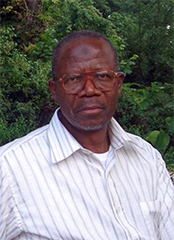 |
|
Prof. Hamza Njozi gave a talk on Mwana Bukhalasi’s epical poem "Utendi wa Masahibu" (An Epical Poem on Adversity), the original version of which was written in Arabic script. His philological and literary criticism of this classical text focused in on the concept of poverty (umaskini), one of the poems central themes. Furthermore, Prof. Hamza Njozi elaborated the challenge of the literary translation of the poem.
Audiodocumentation of the baraza  |

Thursday, 3. June 2010, 4 pm, ZMO
Twen'zetu Mtandaoni - Freddy Macha, msanii wa vipaji vingi – Let’s return home to the internet – Freddy Macha, an artist with many talents
Baraza with Lutz Diegner (Humboldt University, Berlin)
In his presentation about Freddy Macha, a Tanzanian novelist and author of "Twenzetu Ulaya", "Mpe maneno yake", "Hamu ya sigara" and "Kifa cha Jafari", Lutz Diegner highlighted this writers presence on the internet as a poet, columnist, internet blog writer and musician.
|
|
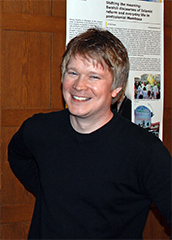
|

Monday, 3. May 2010, 4 pm, ZMO
Uzinduzi wa kitabu cha kusikiliza: Tafsiri ya Kijerumani ya riwaya ya "Mzimu wa watu wa kale" ya Mohamed Said Abdullah - Audio book launch and German translation of Mohamed Said Abdullah's Detective Story "Mzimu wa watu wa kale" (Shrine of the Ancestors, 1960)
Baraza with Guido Korzonnek (Kalamu, Berlin)
On the realisation of an idea: from the translation of the Swahili detective story "Mzimu wa watu wa kale" (Shrine of the Ancestors, 1960) by Mohamed Said Abdullah to the founding of the kalamu publishing house (Berlin) and its production of the translated novel as an audiobook.
Audiodocumentation of the baraza  |
|
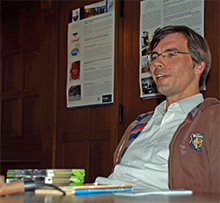
|

Thursday, 11. March 2010, 4pm, ZMO
Usomaji wa mshairi Abdilatif Abdalla - A Reading by the poet Abdilatif Abdalla
Baraza with Abdilatif Abdalla (University of Leipzig)
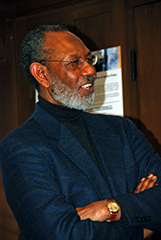 |
|
Abdilatif Abdalla, a lecturer for Swahili at Leipzig University and a famous poet, vividly talked about his experiences as a political activist during the first phase of Kenya's independence. He illustrated his presentation with a pamphlet "Kenya: Twendapi?" (Kenya: Where are we going?) in which he had articulated a critique of the increasingly repressive Kenyatta regime in 1968. Furthermore, he recited extracts from his anthology of prison poems, "Sauti ya dhiki" (Voice of Despair, 1973), written during his three year solitary confinement. Anna Jäger was reading the German translations.
Audiodocumentation of the baraza  + Part 2 + Part 2  |
| |
|
|
|

Tuesday, 9. March, 4pm, ZMO
Special English Talk and discussion round with Abdilatif Abdalla: about his writing, his life and his political activism
Baraza with Abdilatif Abdalla (University of Leipzig)
Abdilatif Abdalla talked about his political struggle against the post-colonial Kenyatta regime, his condemnation to solitary confinement, his life in exile and his political collaboration with the renowned Kenyan writer Ngugi wa Thiong'o during his exile in London.
Audiodocumentation of the baraza 

Thursday, 4. February 2010, 4pm, ZMO
"Sauti ya Haki":Mazungumzo kuhusu gazeti ya Kiislamu iliyochapishwa Mombasa (1972-82) - Sauti ya Haki: "The Voice of Justice": an Islamic, Kenyan Journal (1972-82)
Baraza with Kai Kresse (ZMO, Berlin)
Kai Kresse presented an Islamic newspaper, "Sauti ya Haki" (Voice of Justice), which was published 2-3 times a year in Mombasa from 1972 to 1982 and provided a common platform for public debate among Muslims in postcolonial Kenya. Taking one issue from 1974 as example, he discussed the ways in which transnational intellectual discourses both from within the Muslim world and western academia were taken up by East African Muslims. |
|
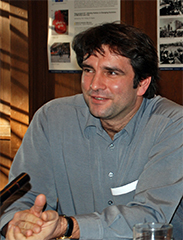
|

Thursday, 7. January 2010, 4 pm
"Pendo la Siri" ya Omar Babu Marjan na "Usaliti" ya Prisca Jerono - An analysis of 's "Pendo la Siri" ("The Love of the Secret") and Prisca Jerono's "Usaliti" (The betrayal)
Students of the African Studies of the Humbort stories by Omar Babu Majan and Prisca Jerono. oldt University (Berlin) presented and analysed contemporary sh

Thursday, 3. December 2009, 4pm, ZMO
"Nyimbo za Vave": Mvutano baina dini na mila - "Vave-Songs": between religion and customs
Baraza with Jasmin Mahazi (Humboldt University/ Free University, Berlin)
The "Vave-Songs", a key element of an agricultural ritual among the Bajuni (Kenya) are on the verge of being forgotten by the younger generation of Bajuni. Jasmin Mahazi, lecturer for Swahili language and literature at the Humboldt University and Free University (Berlin) gave a presentation of her project of documentation as well as an insight into her anthropological and literary research of this oral tradition. |
|
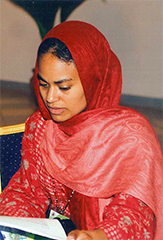 |

Thursday, 5. November 2009, 4pm, ZMO
Mazungumzo na Mzee Adam Shafi kuhusu fasihi, jamii, siasa na utamaduni kwa jumla - Novelist Adam Shafi on the role of Swahili Literature in the society and culture of post-colonial Tanzania
Baraza with Shafi Adam Shafi (Dar es Salaam, Tanzania)
Shafi Adam Shafi, renowned Tanzanian novelist (author of "Kasri ya Mwinyi Fuad" (The Palace of Mwinyi Fuad, 2007, which has been translated into German and French), "Vuta n'kuvute" (Tug of war, 1999) and "Kuli" (Shipyard, 2005) among others) gave an insight into his life and work as a Swahili writer. He also touched on the issues of reading culture and curricula in respect to Swahili literature in East African schools.
|